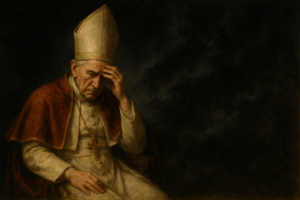As we continue our journey into Christ Consciousness, it becomes impossible to ignore the gaping holes in the mainstream biblical narrative. Many seekers begin to realize that something is missing—that the teachings of Jesus as preserved in modern Christianity feel diluted, controlled, and stripped of their original mysticism and empowerment. And for good reason.
What many don’t know is that entire books and teachings—some of which hold profound keys to personal awakening and the divine nature within—were deliberately excluded from the Bible. These texts, known today as the Gnostic Gospels, offer a radically different version of early Christianity. Rather than promoting obedience to an external God and submission to a religious hierarchy, these scriptures point to self-knowledge, inner transformation, and direct access to the divine within.
And they were banned.
What Are the Gnostic Gospels?
The term “Gnostic” comes from the Greek word gnosis, meaning inner knowledge or spiritual insight. Gnostic Christians believed that salvation came not through faith in church doctrine or blind obedience, but through personal realization of the divine spark within each of us.
These texts were hidden away for nearly 2,000 years, buried in jars and caves—until their discovery in 1945 near Nag Hammadi, Egypt. The Nag Hammadi Library revealed dozens of texts including:
- The Gospel of Thomas
- The Gospel of Mary Magdalene
- The Gospel of Philip
- The Secret Book of John
Each of these challenges the official church narrative in powerful ways. For example, The Gospel of Thomas records Jesus as saying:
The kingdom is inside of you, and it is outside of you… When you come to know yourselves, then you will be known, and you will realize that you are the sons of the living Father.”
There’s no talk of churches, sin, or blood atonement—just direct access to the divine through knowing yourself.
Why Were These Teachings Suppressed?
The early Church Fathers saw the growing Gnostic movement as a threat. Gnostic teachings undermined institutional authority, questioned rigid dogmas, and taught that you didn’t need priests or temples to access God—you only required to look within.
At the Council of Nicaea in 325 CE, under Emperor Constantine, the official canon of scripture was consolidated—and many ancient texts were left out on purpose. These decisions weren’t just spiritual; they were political. By selecting texts that reinforced obedience, original sin, divine punishment, and external worship, the Church solidified its role as the gatekeeper to salvation.
The rest? Declared heresy, burned, or buried—until now.
The Gospel of Mary Magdalene: Silenced Wisdom
In Church tradition, Mary Magdalene is often reduced to a repentant prostitute. However, Gnostic texts reveal her to be one of Jesus’ closest disciples and a teacher in her own right. In the Gospel of Mary, she imparts teachings on the soul’s journey and its liberation through inner understanding. She challenges Peter’s authority and is acknowledged by Jesus as someone who “understood completely.”
This echoes the suppressed divine feminine aspect of spiritual power—a balance that was eliminated from the masculine-dominated Church narrative. Mary represents intuition, wisdom, and direct inner knowing.
Parallels in the Ethiopian Bible
One of the most compelling arguments that the Church deliberately trimmed spiritual truth comes from the existence of the Ethiopian Orthodox Tewahedo Bible—the oldest and most complete biblical canon, containing 81 books.
Unlike the Western canon, the Ethiopian Bible includes:
- The Book of Enoch – details angelic realms, divine law, and esoteric cosmology.
- The Book of Jubilees – retelling Genesis with greater spiritual and mystical depth.
- The Book of Wisdom – emphasizes spiritual discernment and the divine within.
These texts resonate deeply with Gnostic principles and Christ Consciousness:
- That the divine spark lives within every human.
- That earthly rulers and systems often act in opposition to spiritual truth.
- That true salvation is awakening, not external redemption.
Why were these texts preserved in Ethiopia but excluded in the West? Ethiopia’s Christian tradition predates Roman Christianity and maintained autonomy from Roman imperial influence, preserving the mystical roots of the faith.
Christ Consciousness and the Forbidden Teachings
All of these texts—Gnostic and Ethiopian—point to a truth that transcends religion:
You are not separate from God. You are an expression of divine intelligence.
Jesus didn’t come to be worshipped. He came to awaken people to the divinity within themselves. He demonstrated a state of consciousness—Christ Consciousness—that is available to all.
The forbidden texts don’t diminish His role. They illuminate it. They show that He was not creating a religion but revealing a pathway.
Why It Still Matters Today
Understanding the full picture of Jesus’ teachings is not just historical curiosity—it’s spiritual liberation.
In a world full of external noise, systems of control, and institutional gatekeeping, the forgotten gospels and suppressed wisdom call us back to the core of spiritual truth:
- You are the temple.
- You are the seeker and the revelation.
- You are not broken or separate—you are divine.
The awakening of Christ Consciousness isn’t about joining a church. It’s about remembering who you are. And these ancient texts, once buried and condemned, are rising again at the perfect time to help us remember.
So, we ask: What else have they hidden from us? And what happens when we uncover it?
Because the real revolution isn’t political. It’s spiritual.



